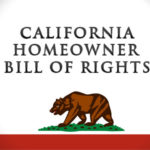Provided by T. Robert Finlay, Esq., Wright, Finlay & Zak
As you may know, when California passed its far reaching Homeowner Bill of Rights (HOBR) in 2012, it was intended to only last through the mortgage “crisis”. In fact, many of HOBR’s most onerous provisions were automatically repealed on December 31, 2017, replaced by similar but less demanding sections. When the Legislature convened in 2017, most industry experts expected to see a bill designed to extend the original provisions of HOBR; but, nothing was introduced. A year later, after servicers adapted their procedures to comply with the scaled back 2018 version of HOBR, Senator Bell proposed SB 818.
SB 818 brings back the original HOBR, almost verbatim. Efforts to derail the bill in the Senate were crushed, showing the Legislature’s support for the bill. No one seemed to care about the impact on servicers of having to, yet again, adapt their procedures. Nor did anyone in the Legislature seem to appreciate the lack of defaults or the CFPB rules that went into effect since HOBR was originally drafted. As a result, SB 818 steamrolled to approval and now sits in front of the Assembly. Changing their tact, industry lobbyist are trying to negotiate a few key changes, with the hopes that the version of the bill that ultimately passes is more servicer-friendly than the proposed version.
Last Friday, Andrew Boylan and myself met with the lobbyists of the California Mortgage Bankers Association (CMBA), California Bankers Association (CBA), California Mortgage Association (CMA) and United Trustees Association (UTA) to discuss the biggest challenges with the original/proposed version of HOBR. We then narrowed our list of issues to the three most important and the three that we believe we have a chance to change.
- Amended the definition of a complete application in Sections 2923.6(h), 2924.10(b) and 2924.18(d) to provide that a servicer does not have to review a complete loan mod application that is received less than 14 days before the foreclosure sale. While servicers would prefer the 37 CFPB cut-off, we were told it was not an option. That said, any cut-off would reduce the problem created by last minute loan mod applications.
a.) In a related change, we added to the post-NOD loss mitigation letter required by 2924.9, a reference to the 14 day cut-off. This is intended to provide the BR with transparency. - Adding a “cease and desist” exception from the required telephone outreach for both 2923.5 and 2923.55. Servicers still struggle with the conflict between state and federal law. These changes would resolve that conflict and allow our clients to honor the BR’s request not to be contacted.
- Added identical provisions to 2924.12(h) and 924.19(h), providing that compliance with the CFPB rules will be deemed compliance with CA HOBR. This concept is consistent with the recent SB1150, NV HOBR and the original version of HOBR (with regards to compliance with the National Settlement).
While we would have loved to make additional changes (or defeat SB 818 all together), that was not an option. Senator Bell already has the necessary votes to pass SB 818. We therefore, limited our requests to those that would provide the most relief. The proposed new language is in the attached draft we prepared for these industry groups.

